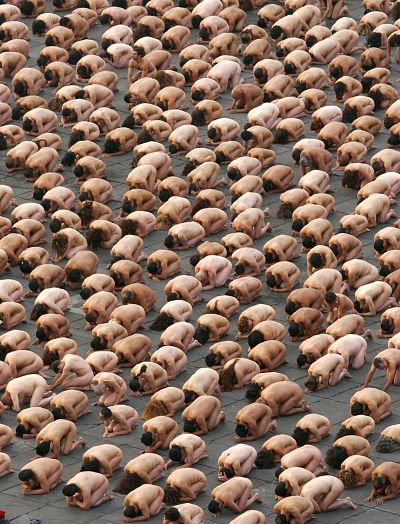In early June, 125 people protested in the nude outside the New York City headquarters of Facebook and Instagram. It worked.
The first time Savannah Spirit remembers Facebook censoring her work takes her back to 2011.
 ADVERTISEMENT
ADVERTISEMENT
 ADVERTISEMENT
ADVERTISEMENT
She was curating a show of erotic art in New York and posted a promotional image to Facebook. The social network promptly took it down, and she was prevented from posting anything else for 10 days.
In the coming years, Spirit, like many other artists, would move to Instagram, where her edgier art — usually with some form of nudity — would often run afoul of the company's policies and be removed. Complaints and protests from artists and arts organizations in real life and on social media, including at least one that went viral, made little progress.
"I started to decide that it just comes with the territory," Spirit said of Facebook's bans.
But arts organizations kept at it. In early June, 125 people protested in the nude outside the New York City headquarters of Facebook and Instagram, covering themselves with stickers of photographed male nipples in protest of the long-argued double standard that only female nipples are against the company's policies.
The artists' action speaks to just how important the platforms, especially Instagram, have become to the arts now that Tumblr — once a haven for artists — does not allow any adult content.
"Instagram has been so important for artists, especially those who don't necessarily have a regular venue for their work," said Svetlana Mintcheva, director of programs at the National Coalition Against Censorship (NCAC), an alliance of more than 50 nonprofits. "But they develop huge audiences on Instagram, and photographic artists more so than others."
The pressure campaign worked. Facebook said it would organize a group of artists, educators and activists to talk about its policies. It's a move that is mirrored in the social network's broader re-evaluation of its content policies as well as its move to find people outside its corporate borders to help rewrite its rules.
It's a start, but the arts community is not declaring victory just yet.
"We don't just want to talk," Svetlana said. "We'd like to see some action, too."
Ruchika Budhraja, a spokesperson for Facebook, said the company was committed to meeting with artists, the NCAC and other stakeholders. "It's important for us to hear directly from different communities who use Facebook and Instagram," she said.
Facebook's challenges over where to draw the line with nudity in some ways pre-date the now-prominent debate over its role in spreading misinformation and hate speech, underscoring how the company's rules have shifted drastically, often in one direction and then the other, during its meteoric rise.
While Facebook banned pornography early on, its efforts to restrict nudity extended to pictures of breastfeeding, a famous French painting of a nude woman and even a New Yorker cartoon. Though the stakes were lower than years later when the company needed to confront issues like fake news and coordinated foreign manipulation campaigns, many activists took the issue no less seriously.
The tenacity of the artist community, even years ago, points to just how central both Facebook and Instagram have become to the daily lives of billions of people as well as to the cultures they participate in. And since Facebook would often delete entire accounts along with their work, artists could spend years building up followings only to see them disappear.
"It takes years to build up a base of followers, so this is no small deal for artists working with the body," said Spencer Tunick, an artist known for his use of nudity — particularly groups of naked people — who helped organize the protest in June. "It's a major issue as we see it now."
Tunick credited artist Micol Hebron with being the first person to digitize the male nipple in 2014 and encourage the public to use it to fight censorship on social media. He stressed that he understands why Facebook needs to draw lines, but that there are ways for the company to embrace experimental art while protecting younger users.
Facebook has shown some flexibility. Gabriella Mas Bell, a lawyer with the law firm Polsinelli who has written about Facebook's censorship of artistic nudity, said that she would have to constantly update her work because the company's terms of service frequently changed.
"I was having to go back and change the language in my article, so you could tell that they were really trying to address it," Bell said. "So I'm not actually that surprised they're trying to find a better solution as they're cracking down on things like hate speech and the abusive language."
For now, however, artists still have to be careful. Spirit said she recently had four pictures deleted from Instagram and knows other artists who were recently banned from the platform for 24 hours for posting some of Tunick's images.
But she said she's hopeful that Facebook could finally make changes. All it took was a few dozen nude people outside one of their offices.
"We got their attention," she said.











